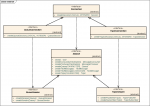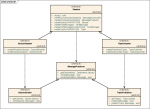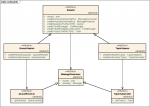Progress Fuse Adapter Documentation
OpenEdge Adapter for Fuse Message Broker
Overview
The OpenEdge Adapter for Fuse Message Broker enables connections from an
OpenEdge™ ABL application to Fuse™ Message Broker or Apache ActiveMQ (or
other messaging solution as described below). It consists of a number of ABL
classes that should be referenced in an ABL application that needs to exchange
messages with the outside world using one of the supported world class
messaging solutions.
This adapter takes care of message manipulation and communication over the
network with the message broker. There is no need to install or load external
libraries; it is a pure ABL solution.
Features
- Pure object-oriented ABL.
- Uses a subset of the standard JMS API. That means your application
uses well-known interfaces and operations to request the services of the
adapter and the message broker. - Communicates using the STOMP
protocol. - Tested with
- Fuse™ Message Broker
- Apache ActiveMQ
- SonicMQ™ with StompConnect
- All source code provided under the conditions of one of the most
permissive open source licenses,
the MIT-license. - Currently supports the following parts of the JMS standard:
- connecting to a message broker anywhere in the network;
- point-to-point messaging with Queue or publish/subscribe style
messaging with Topic; - producing and consuming Message or TextMessage instances;
- part of the standard JMS message headers (JMSMessageID,
JMSCorrelationID); - JMS 1.1 unified messaging domain interfaces.
The product is usable, but development has not stopped. The initial
developers are still extending the list of features. The following aspects of
the JMS standard are feasible with the STOMP protocol, but not (fully)
supported yet.
- sending and receiving BytesMessage instances;
- other standard JMS message headers;
- different DeliveryMode values;
- message selectors;
- JMS transactions;
- durable subscriptions.
Requirements
- Developers who are familiar with standard messaging concepts and have
some knowledge of the JMS API. - OpenEdge™ 10.2 or later. The initial developers consider creating a
backport for OpenEdge™ 10.1C later. - Messaging product that communicates using the STOMP protocol, such as
- Fuse™ Message Broker;
- Apache ActiveMQ;
- any other standard JMS provider (such as SonicMQ) with StompConnect. Such a
configuration requires setting up and operating a separate server for
the STOMP protocol, that communicates with the message broker using the
standard JMS API. An implementation of the JMS API is available in
libraries provided with the messaging system.
Installing and configuring the required products is not described here.
Please refer to the appropriate product documentation.
More information
Addtional documentation for the OpenEdge Adapter for Fuse Message Broker:
External documentation:
- "Messaging
and ESB" from the OpenEdge™ documentation (probably also available
locally). This document provides an introduction to messaging with
OpenEdge™ ABL and SonicMQ™. The introduction to general messaging
concepts is useful. The programming model for the SonicMQ™ adapter is
less relevant, because that software provides a product-specific approach,
instead of the standard JMS API that is implemented by the OpenEdge Adapter
for Fuse Message Broker. - JMS 1.1 API
documentation: details of the full JMS API, of which the OpenEdge
Adapter for Fuse Message Broker implements a part. The part of the JMS API
that is provided by the OpenEdge Adapter for Fuse Message Broker is
described in a separate document in this
distribution.
Alternative product:
- A contribution to The OpenEdge
Hive provides a different approach to messaging using the STOMP
protocol.
API for the Progress Adapter for Fuse Message Broker
OpenEdge Adapter for Fuse Message Broker API
The API supported by the adapter is a subset of the JMS API. Full
documentation of all details is available online. The
diagrams below only describe the part of the API that is implemented by the
OpenEdge Adapter for Fuse Message Broker.
Notes:
- Getters and setters are actually implemented as ABL PROPERTY members.
- The actual interface definitions contain operations not specified in the
JMS API or the diagrams. Those operations are workarounds for OpenEdge™
limitations. When those limitations are resolved, the additional operations
might be removed. - The actual interface definitions might contain additional JMS 1.1
operations that are not currently supported by adapter implementation
classes.
![]() foundationclass
foundationclass
 connectionclass
connectionclass
 sessionclass
sessionclass
 producerclass
producerclass
 consumerclass
consumerclass
Change log for the Progress Adapter for Fuse
Changelog
- ????????
- Logging more flexible (undocumented).
- No more default output for log messages using LOG-MANAGER.
- Tests modified to produce same output as in previous release.
- 20090423
- Initial public release.
MIT Progress Adapter for Fuse
Copyright (c) 2009 Flusso B.V.
Permission is hereby granted, free of charge, to any person obtaining a copy
of this software and associated documentation files (the "Software"), to deal
in the Software without restriction, including without limitation the rights
to use, copy, modify, merge, publish, distribute, sublicense, and/or sell
copies of the Software, and to permit persons to whom the Software is
furnished to do so, subject to the following conditions:
The above copyright notice and this permission notice shall be included in
all copies or substantial portions of the Software.
THE SOFTWARE IS PROVIDED "AS IS", WITHOUT WARRANTY OF ANY KIND, EXPRESS OR
IMPLIED, INCLUDING BUT NOT LIMITED TO THE WARRANTIES OF MERCHANTABILITY,
FITNESS FOR A PARTICULAR PURPOSE AND NONINFRINGEMENT. IN NO EVENT SHALL THE
AUTHORS OR COPYRIGHT HOLDERS BE LIABLE FOR ANY CLAIM, DAMAGES OR OTHER
LIABILITY, WHETHER IN AN ACTION OF CONTRACT, TORT OR OTHERWISE, ARISING FROM,
OUT OF OR IN CONNECTION WITH THE SOFTWARE OR THE USE OR OTHER DEALINGS IN
THE SOFTWARE.
Progress Fuse Adapter Project
Progress Fuse Adapter
Written in OO ABL and supports the stomp protocol.
Code comments in Dutch
Using the Progress Adapter for Fuse Message Broker
Using the OpenEdge Adapter for Fuse Message Broker
Getting started
Prerequisites
- The message broker must be running. If the broker requires authentication
you must know a user name and password. - The STOMP listener must be accessible over the network. You must know the
host name and port number. - The directory stompAdapter from the adapter code distribution must be in
the PROPATH.
Defining the connection with the broker
In JMS you need 2 objects to collect the connection parameters with the
message broker: a ConnectionFactory that knows where to connect,
and a Connection object that knows how to authenticate for a
session (next step). In this example we assume that the broker is running on
the develement machine and the STOMP listener uses the default port number.
factory = NEW nl.flusso.stomp.ConnectionFactory('localhost':U, 61613).
connection = factory:createConnection('username':U, 'password':U).
If your broker does not require authentication, you can supply the unknown
value for both user name and password:
connection = factory:createConnection(?, ?).
Starting a session and cleaning up
A JMS session encapsulates all communication with the broker (using an ABL
SOCKET object). After using the session object for exchanging messages with the
broker, we need to release operating system resources and tell the broker we do
not want to receive any more data. The broker uses this notification to clean
up resources allocated for us.
jmsSession = connection:createSession(FALSE, {&CLIENT_ACKNOWLEDGE}).
/* Exchange messages with the broker, see below. */
FINALLY:
jmsSession:close().
END FINALLY.
In the example above we indicate that we do not want to group sent messages
using explicit transactions, but we do want to acknowledge the successful
receipt and processing of messages that the broker sent to us. If we would
choose automatic acknowledgement, messages for us are considered done when they
are sent by the STOMP subsystem of the broker, before we even know that there
are bytes on their way over the network channel.
Preparing for message exchange
A JMS Destination is an abstract concept that denotes the place
where we sent messages to or receive messages from. It could be either a
Queue or a Topic. We send messages to a
Destination using a MessageProducer and receive from
a Destination using a MessageConsumer.
destination = jmsSession:createQueue('SampleQ1':U).
producer = jmsSession:createProducer(destination).or
destination = jmsSession:createQueue('SampleQ1':U).
consumer = jmsSession:createConsumer(destination).Sending messages
After all the preparations above we are ready to create a message and send
it.
messageToSend = jmsSession:createTextMessage('Hello world':U).
producer:send(messageToSend).Full example, now including all declarations:
USING javax.jms.*.
ROUTINE-LEVEL ON ERROR UNDO, THROW.
{javax/jms/Session.i}
DEFINE VARIABLE factory AS ConnectionFactory NO-UNDO.
DEFINE VARIABLE connection AS Connection NO-UNDO.
DEFINE VARIABLE jmsSession AS Session NO-UNDO.
DEFINE VARIABLE destination AS Queue NO-UNDO.
DEFINE VARIABLE producer AS MessageProducer NO-UNDO.
DEFINE VARIABLE messageToSend AS TextMessage NO-UNDO.
factory = NEW nl.flusso.stomp.ConnectionFactory('localhost':U, 61613).
connection = factory:createConnection('username':U, 'password':U).
jmsSession = connection:createSession(FALSE, {&CLIENT_ACKNOWLEDGE}).
destination = jmsSession:createQueue('SampleQ1':U).
producer = jmsSession:createProducer(destination).
messageToSend = jmsSession:createTextMessage('Hello world':U).
producer:send(messageToSend).
FINALLY:
jmsSession:close().
END FINALLY.Receiving messages
Receiving a message is somewhat more complicated than sending one, because
we need to find out what kind of message we received before we can process it.
In ABL we do that by trying to cast the message to a type that we can handle.
In the example below we ignore messages of other types, and in particular we do
not acknowledge the receipt of those messages. That way those messages will
remain available for other clients to process.
USING javax.jms.*.
ROUTINE-LEVEL ON ERROR UNDO, THROW.
{javax/jms/Session.i}
DEFINE VARIABLE factory AS ConnectionFactory NO-UNDO.
DEFINE VARIABLE connection AS Connection NO-UNDO.
DEFINE VARIABLE jmsSession AS Session NO-UNDO.
DEFINE VARIABLE destination AS Queue NO-UNDO.
DEFINE VARIABLE consumer AS MessageConsumer NO-UNDO.
DEFINE VARIABLE genericMessage AS Message NO-UNDO.
DEFINE VARIABLE textMessage AS TextMessage NO-UNDO.
DEFINE VARIABLE textBody AS LONGCHAR NO-UNDO.
DEFINE VARIABLE textLength AS INTEGER NO-UNDO.
factory = NEW nl.flusso.stomp.ConnectionFactory('localhost':U, 61613).
connection = factory:createConnection('username':U, 'password':U).
jmsSession = connection:createSession(FALSE, {&CLIENT_ACKNOWLEDGE}).
destination = jmsSession:createQueue('SampleQ1':U).
consumer = jmsSession:createConsumer(destination).
genericMessage = consumer:receive().
textMessage = CAST(genericMessage, TextMessage) NO-ERROR.
IF NOT ERROR-STATUS:ERROR THEN
DO:
textBody = textMessage:text.
textLength = LENGTH(textBody).
MESSAGE (IF textLength < 100 THEN STRING(textBody) ELSE 'long message') VIEW-AS ALERT-BOX.
textMessage:acknowledge().
END.
FINALLY:
jmsSession:close().
END FINALLY.Hints
Use interfaces
In the examples above all class-based object variables are defined as having
an ABL interface type. That is is a recommended practice for general OO
programming, but in particular when using the OpenEdge Adapter for Fuse Message
Broker. Developers reserve the right to change all implementation classes in
package nl.flusso.stomp, except ConnectionFactory. All operations
after obtaining a ConnectionFactory instance can be accomplished
using only interface type variables and parameters.
More examples
The stompTests directory in the source distribution contains our general
test cases. They show some more possible usage scenarios.
Note that those tests (and the adapter implementation itself) tend to delete
all objects explicitly, instead of relying on the 10.2 garbage collector. That
is not because we think it is better or we prefer to do unnecessary work, but
it is part of the preparation for a planned backport to 10.1C.
Full documentation
The OpenEdge Adapter for Fuse Message Broker implements a pure subset of the
standard JMS API. The part that is implemented, should follow the specification
faithfully. There are no intended extensions of the specification (except as
workarounds for OpenEdge™ limitations, see below).
In a separate document we describe what part of the
JMS API is currently supported. All details of the API are described in the
standard JMS 1.1 documentation (available online) and in
several works available at your favorite book seller.
Java API to ABL translation rules
The following rules were applied for translating the JMS API specification
to ABL definitions.
- In general Java interfaces correspond with ABL interfaces, Java
operations with ABL methods, etcetera. Exceptions are mentioned below. - Property getter and setter operations are translated to ABL PROPERTY
members of classes and interfaces. - Constants (final static interface members) are translated to preprocessor
definitions in an include named after the interface, e.g.
javax/jms/Session.i. - We had to introduce a lot of workarounds for current OpenEdge™
limitations. Many of the workarounds involved introducing extra method
overloads to the JMS interfaces. We tried to make this transparent for
users of the adapter, but in some cases you might find out that a
workaround for a still missing OO feature is not the same as a
straightforward implementation in a mature OO environment.